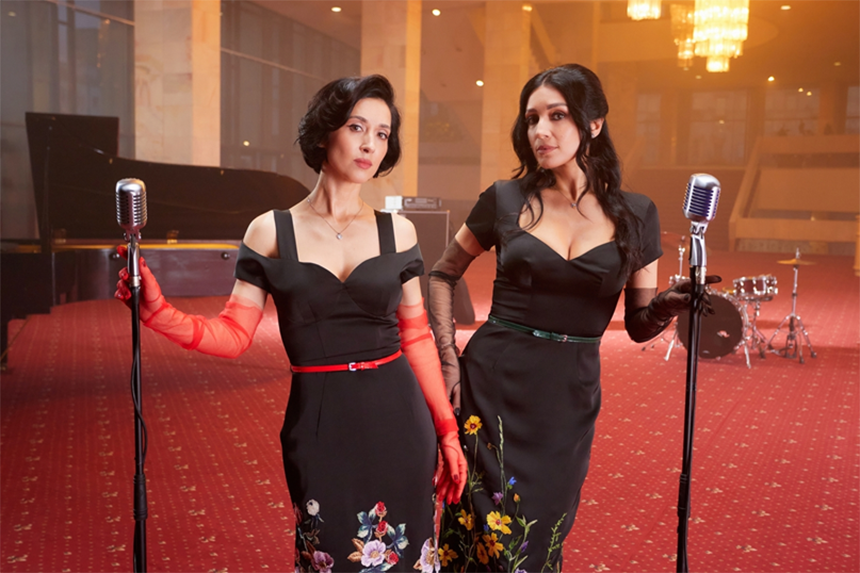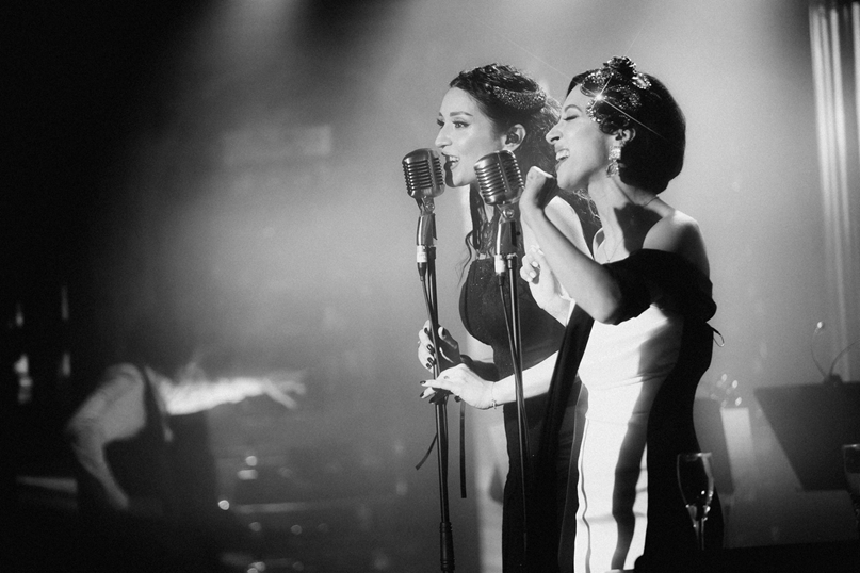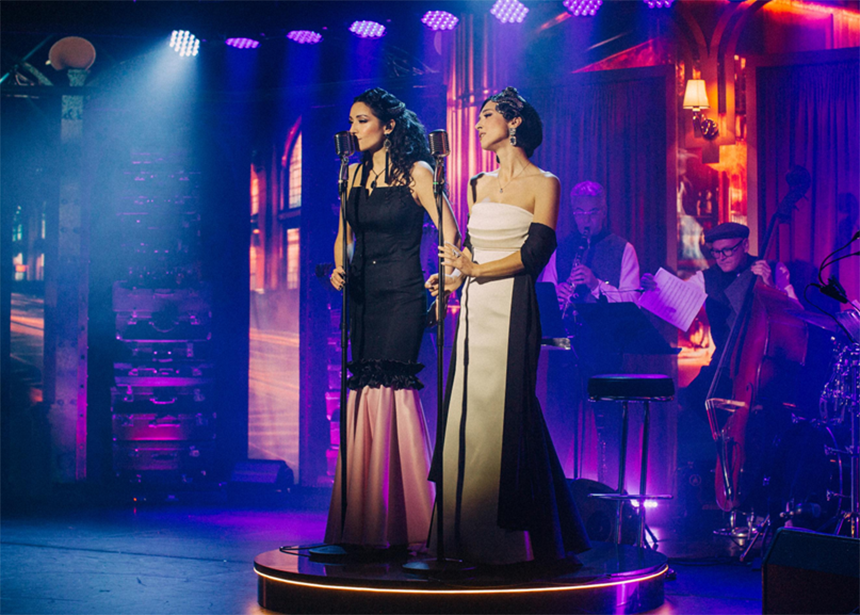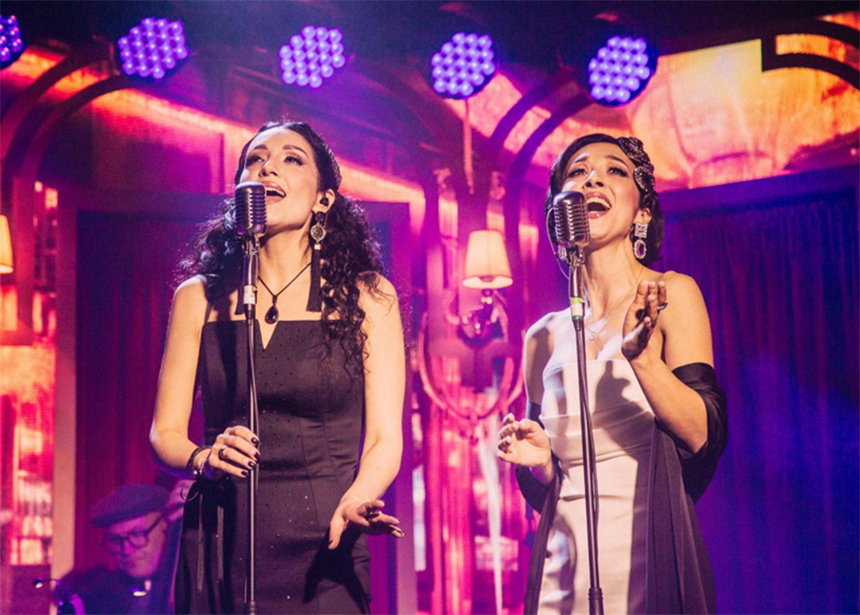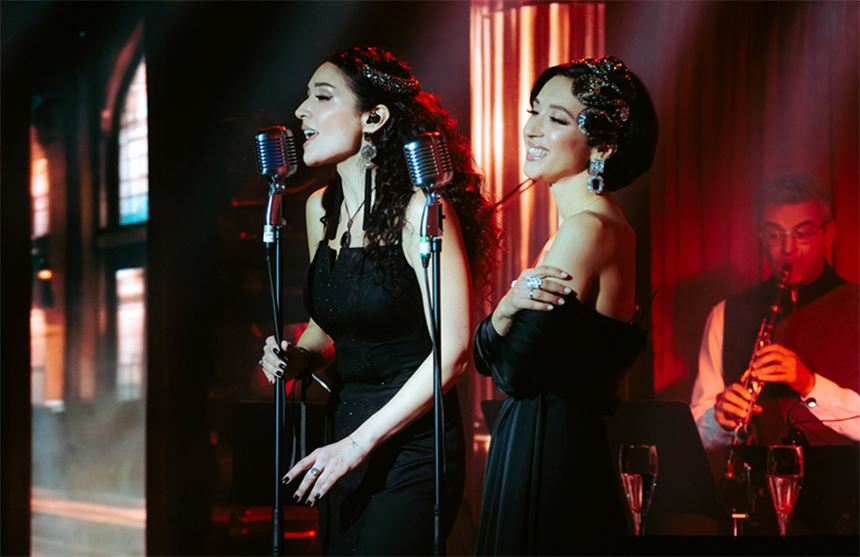The Alibi Sisters: Ukrainian-Jewish karmic connection
The female duo of Anna and Angelina Zaval'sky, known as The Alibi Sisters, has been shining in the Ukrainian-Jewish musical scene for five years. Their songs in Yiddish and Ukrainian captivate with charm and melody, reviving a seemingly lost world. The Ukrainian Jewish Encounter presents an exclusive interview — a heart-to-heart conversation with Anna Zaval'ska.
The interview was conducted and edited by Shimon Briman, UJE's liaison in Israel.
Shimon Briman: Was there anything in your childhood that reminded you of your Jewish roots? Communication with relatives, family stories or moments during holidays, or dishes from Jewish cuisine?
Anna Zaval'ska: Even at the everyday level in Ukraine, we partially remain carriers of Jewish culture: songs, names of dishes, and some jargon and slang elements in the language (for example, those that allow you to swear colorfully: "myshygine kopf" — stupid head, etc.).
Challah buns and fish dishes in Ukraine are recognized by all families, it seems, regardless of religion or nationality. They often appear on holiday tables at home.
But my sister and I began to explore the Jewish traditions of celebrations and customs in greater detail during our adulthood, alongside our study of the Ukrainian-Yiddish cultural heritage.
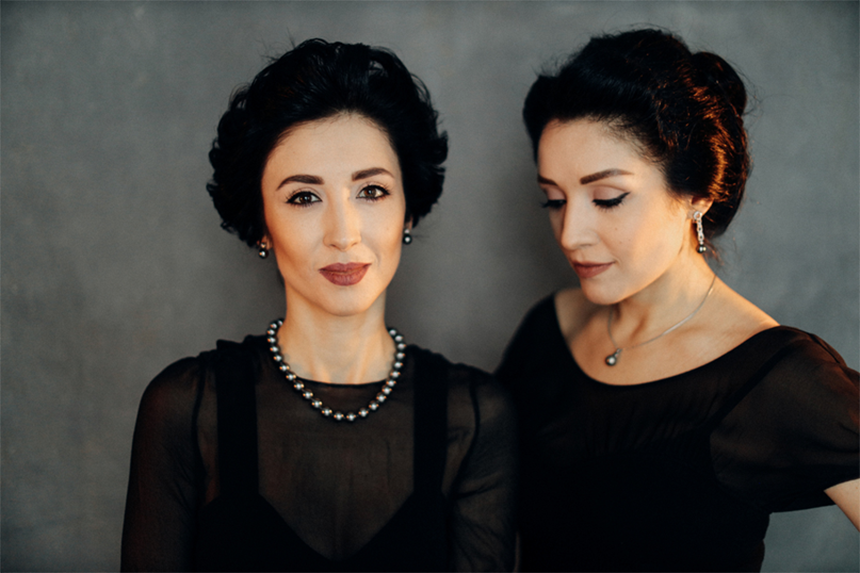
We never truly considered our personal connection to the Jewish context during childhood; this topic was largely taboo in the post-war years of the Soviet Union.
Our genetic heritage is evident in our surname. Our grandfather was Andriy Zaval'sky, a man with graceful, aristocratic facial features and amazing, deep eyes, about which it can be said that "they have all the sorrow of the Jewish people."
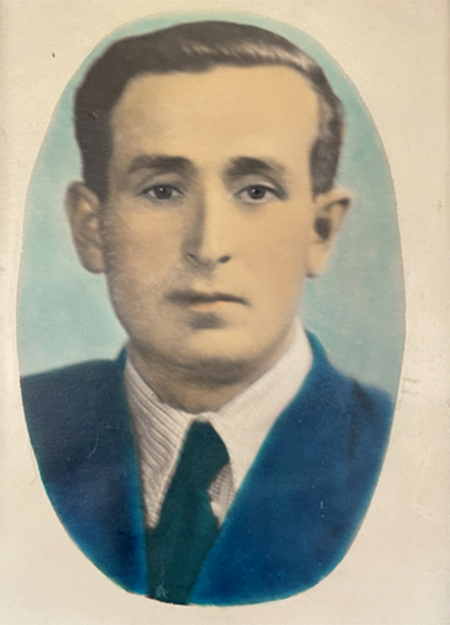
For us, his image has always been distant, mysterious, and magnetic, as we never knew him. My grandfather died when our father was only five years old. It is said that his great-grandmother, Jadwiga, was a Polish Jew. However, no evidence or confirmation of this has been preserved.
Our surname, Zaval'sky, belonged to a small circle of families, primarily in Podillia and partially in Kyiv. In the pre-revolutionary lists of Jews in Kyiv, the surname Zaval'sky appears less frequently than, for example, Brodsky or Zaitsev, but it was established. The metric books of synagogues in Kyiv from 1870 to 1900 contain several records of births in families with the surname Zaval'sky. After the revolution, some members of the Zaval'sky family emigrated, with evidence indicating departures to the United States and the Land of Israel in the 1920s and 1930s.
I remember how my father's mother, our grandmother Vira, an ethnic Ukrainian, often used words that were unfamiliar to us in everyday life — they sounded very exotic and unusual. We asked her what they meant, but she only laughed and joked: "It's German." Perhaps because of well-known reasons, everything related to Jews was carefully hidden and not advertised in any way.
Later, we learned that as a child, she spent several years in a boarding school in the Zhytomyr region because her mother, having been widowed early, could not support her daughters on her own. In the institution, many nurses and educators communicated mainly in Yiddish. It was from there that she adopted and incorporated many words and expressions into her own speech.
Also, my grandmother often sang us old songs, among which was our favorite — as if accompanied by a trail of her vintage perfume and lipstick — "Vi iz dos gesele." It is always associated with her. I remember how one day my grandmother suddenly sang this song in a language unfamiliar to us — this was when we first heard it in the original Yiddish. Later, we listened to it performed by The Barry Sisters from vinyl records. We were literally frozen by the beauty of such a combination of melody and text, the sad and deep meaning of which we learned much later.
Since 2021, you have been performing again with your sister — but in a new Ukrainian-Jewish style. Why did you choose the Ukrainian-Jewish song and music sphere for the duo's new image?
It is quite difficult to answer the question of why — throughout our lives, while immersed in Ukrainian folklore, show business, and pop — we suddenly became interested in Jewish culture and unexpectedly sang in Yiddish. Let's be honest, as in the saying: "Well, first of all, it's beautiful."
In fact, numerous prerequisites and factors played a key role in this: from repeated participation in international festivals (this formed respect for other national flavors and provided an opportunity for cultural exchange) to fateful meetings with interesting personalities — carriers of Jewish culture who, through music and their biographies, fell in love with it.
Now we are deeply inspired and motivated by our collaboration with an exceptional Yiddish teacher from The Center for the Studies of History and Culture of East European Jewry (Judaica Center) at the Kyiv-Mohyla Academy, Oleksandra Uralova.
I see in you a deep immersion in the context and history of each song, which your duo uses as a basis to create video clips. Who in your team selects these songs, and who is professionally engaged in their modern processing?
The main ideologist and musical strategist from the very beginning of the restart of The Alibi Sisters project is composer and arranger Dmytro Saratskyi. All musical content reflects his taste and vision. Thanks to him, we record songs and shoot most of our videos in a live performance format — that is, the sound is usually recorded live in several integral takes. This is all made possible by Dmytro's skill and professionalism.
If we draw a parallel with The Barry Sisters, he is definitely our Abraham Ellstein who arranged Jewish folk songs for the legendary duet.
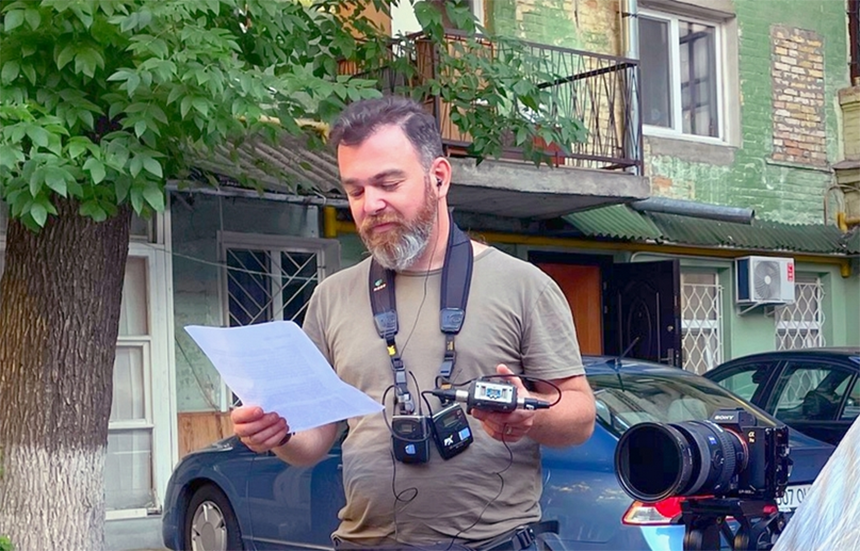
When you are referred to as the "Ukrainian Barry Sisters," do you feel proud of it, or do you perceive it as being viewed merely as a modern version of the American-Jewish stars of the 1950s and 1960s?
We feel self-sufficient! We can play with stylizing while remaining true to ourselves.
The moment has come when our resemblance to The Barry Sisters has become not only an obvious advantage but also a relevant and organic stage in our artistic career. It is especially important that we possess this genetic trait: the beautiful sound of the famous "sister trio"; it would be a mistake not to use it.
And we cannot ignore that before emigrating after the pogroms, the father of Mina and Clara Bagelman (The Barry Sisters) once lived in Podil, our native Kyiv, and was famous for his bakery. There are many mystical hints about our karmic connection!
They say, "Our history is written by songs," so it is very important for us to study and introduce people to the stories of the songs in the repertoire of The Alibi Sisters. We especially love those in which Ukrainian and Yiddish are intertwined. Focusing on this, we build our repertoire.
With many projects and creative experiments behind us, we can afford to do what goes against modern trends and enjoy music "out of time" today. We are unafraid to reproduce them, preserving their authentic melody and naivety in retro hits without modernizing them.
We have worked in a retro style for a long time. Aesthetically and visually, the duo The Alibi Sisters recreates images of 1950s–60s pop culture while also maintaining a distinctive performance style.
We emphasize our visual and vocal similarity to The Barry Sisters, understanding that we evoke nostalgic memories in the audience by transporting listeners back to their childhood or youth.
We strive to create the perfect atmosphere on stage: an orchestra, a style full of elegance, theatrical lighting, and impeccable sound — all designed to evoke memories of the past and provide mature aesthetic pleasure.
You performed in Kraków with the program "A Return to the Yiddish World." But is it possible to return to the Yiddish world — to a world that has long since disappeared? The vast majority of Ukrainians, and even Jews, when they hear songs in Yiddish, do not understand the words without translation. People see bright women on the screen who sing beautifully, but do not grasp the song's meaning. How can we resolve this contradiction?
This world has not disappeared at all, because those fortunate enough to survive the Second World War retained invaluable bricks to begin rebuilding everything anew overseas.
"Yiddishkeit" is not only about the towns burned by the Holocaust, with all their inhabitants and memories of the past. It encompasses something much broader. Returning to this world is a symbolic and poetic dream, a dream of something taken away but not lost. We are left with other people's memories, a few books, and the voices of old songs that still resonate on old records or in the hearts of a few.
Once upon a time, Yiddish culture flourished in the towns and large cities of Eastern Europe. It thrived in songs, fairy tales, anecdotes, books, fairs, schools, and synagogues. It was a world where the Yiddish language was not just a means of communication but the soul of the people — gentle, witty, tragic, and wise. People shared stories in Yiddish, laughed and prayed, raised children, and debated life.
Of course, it is impossible to return to this world physically. However, it is our duty to retain the memory of it. We must remember not only the tragedy but also the life: laughter in the streets, the smell of cholent on Saturday, conversations about the Talmud, and love. In our imagination, it was a world that exuded humanity, akin to how it can be felt in the books of Sholem Aleichem.
We may not be able to revive it, but we can honor it, and this is also a form of return.
In today's world, the number of individuals attracted to Yiddish culture is continually increasing! Yiddish songs are performed at concerts, klezmer music festivals, and theaters.
In some Jewish communities, particularly in the United States, Israel, Great Britain, and Canada, Yiddish remains a vibrant language of communication. Many universities across the globe offer programs for the study of Yiddish, its literature, and cultural history.
Even on Duolingo, you can learn Yiddish. For several years, there has been an academic dispute about which kind of Yiddish to teach on the educational platform: whether literary Yiddish, Western Yiddish, Northern (Lithuanian) Yiddish, or perhaps our Ukrainian or Polish... and they settled on the Galician-Hasidic version of the language! This is precisely the Yiddish heard in the sound of The Barry Sisters, and, in fact, we also use this pronunciation with its phonetic features.
Regarding the content and comprehension of the lyrics, this is not the primary condition, as the language of music and aesthetics is universal. We do translate all the texts, understanding what we sing about and adding a little Ukrainian to them. In our theatrical concert program "My Jewish Soul," we created special programs for the audience that included translations of all texts, but it was not crucial, as beauty captivates in any language.
Did you consider expressing yourself in Hebrew in the song, the living colloquial language of the revived Jewish state?
There are several songs in Hebrew in our repertoire, but it is important for us to sing organically in Yiddish, which we are still learning to this day. There are several reasons for this. Firstly, "mame-loshn" embodies a nostalgic vibe, characteristic of Jewish music from the 19th and 20th centuries.
Furthermore, the music of the Jewish state — Israel — is neither particularly native nor understandable to us; we lack knowledge of or connection to the cultural context. Therefore, it would be, at the very least, unfair and inaccurate.
Instead, we live where Yiddish was once spoken, and it is our creativity that makes this language more fitting. It is also pleasant and significant for us to remain in this slightly spiritual world of memories of our shared Ukrainian-Yiddish past.
Do you think Russia's war of aggression against Ukraine has influenced the growing interest among Ukrainians and globally in the Jewish-Ukrainian topic? How do you feel when you shoot a video with a song about Hanukkah in Kyiv, which is under Russian missile strikes? How has this war impacted your life and work?
In the most challenging times for our country, it is vital for us to stay at home! This way, we can empathize with the pain and express it through creativity, free from falsehood and distortion. Art is also a weapon, so it is very important today, when a terrible war has come to Ukraine, when our cities are being destroyed, that we must, through our own experience, again and again remind the world about the Jews who suffered during World War II, about the attempt to destroy an entire unique culture.
We hope that today our voices, with which we sing songs in Yiddish, ring more resonantly than ever and draw the world's attention to our plight.
By the way, we shot a video for Hanukkah for a cover of the song by the famous band The Klezmatics on Andriyivskyi Descent, the morning after a terrible shelling. When filming began, another air raid siren sounded. We were very afraid that we wouldn't have time to shoot takes. We waited until the all-clear signal, and then continued working.
This is absolutely about resilience and disobedience. Despite the enemy's desire to destroy us morally and physically, we work with double strength, as we will not have another life or another country that we love so much.
Just before the war, we made a film about Yiddish, its origins, and the lives of Jews in Ukraine and, above all, in Kyiv. In the film, we still spoke Russian because, before the war, we naively believed that the global Jewish diaspora would understand us this way; however, we immediately added English subtitles. We have never spoken Russian publicly or abroad since then. This is a principled position.
We plan to create films not only about Kyiv but also about other cities and towns in Ukraine linked to Jewish life: Uman, Berdychiv, Chernivtsi, Odesa, Chernobyl, and others.
The song "Yoshke fort avek", according to musicologists, is an ironic song with an element of mockery, written about the mobilization for the Russo-Japanese war in 1904 of a Jewish gangster in Vilnus, who was engaged in extortion from Jewish merchants, and left his pregnant fiancée in the city. In your performance, it is a lyrical song about farewell. How does this song sound against the backdrop of the current problems of mobilization in Ukraine?
There are many examples of songs whose meanings change within the context of time and history. For instance, the song "Bei Mir Bistu Shein," which was written by Sholom Secunda for a musical in the 1930s, became so popular in the twentieth century that it was translated and altered many times to reflect the context of its era. There are numerous interpretations of it — ranging from theatrical to semi-criminal.
The song "Yoshke Fort Avek" in our country tells the story of bidding farewell to a brother, fiancé, and son going to war. Everyone says goodbye to Yoshke at the station, enduring a painful separation. "Another moment, one more kiss and hug, and the train will go..."
Today, this song, performed by us and in the author's version, feels like a dedication to those who defend our country from the enemy. It captures all the drama of the situation and the strength of the faith in loving hearts that the boy will return home. This theme truly resonates with every Ukrainian today.
When we performed this song on a television program set, it sounded exactly as a real klezmer should. The accordion was played by the Crimean Tatar musician Shevket Zmorka, the clarinet was played by the musician and military serviceman Oleh Kaduk, and Ukrainian singers sang a folk Greek melody in Yiddish. This is an interesting and organic combination of cultures, styles, and history. This is our specialty.
Are there any plans to create entirely new original Jewish-Ukrainian songs — not based on "good old classics"? In which countries has your duo performed Jewish and Ukrainian songs?
Yes, as songwriters, we plan to create original material that aligns with our stylistic concept and write lyrics in both Ukrainian and Yiddish. Everything has its time. It takes resources and effort to do it.
As for our performances in other countries, we have already had the honor of playing our program at many venues in Europe: Moderna Museet/Modern Art Museum in Stockholm and The Salon of the Sphinx festival in Capri, Italy. We were also guests at the Jewish Culture Festival in Krakow, performing on the stage of the Galicia Jewish Museum.
This spring, we toured Israel and attended concerts in nearly every city from the south to the north of the country. It was a wonderful experience to connect with an older live audience, native speakers of the Yiddish language, who understand the songs of The Barry Sisters. Our cover versions of these songs are the most viewed in Israel, and we receive the most feedback from there.
We are always warmly welcomed abroad, as good music leaves no one indifferent. In each of our performances, we showcase a small part of our vibrant musical multicultural palette: an incredible fusion of Ukrainian, Jewish, Polish, Gypsy, Tatar, and Moldavian traditions. We emphasize that our uniqueness lies in diversity.
There are both good and bloody pages in the history of Jewish-Ukrainian relations. What is more, in your opinion, in the centuries-old history of relations between our two peoples? How have the current wars in Ukraine and Israel affected or will affect the future relations between Ukrainians and Jews, Ukraine and the State of Israel?
From an early age, we were taught to respect the customs and rituals of different peoples, especially those who have lived and continue to live on our territory. Jews and Ukrainians have coexisted here for centuries; thus, the cultural influence and mutual exchange are evident. We are different, but we share much in common. Ukrainians eat Kalyta on St. Andrew, and Jews serve Hamantash on Purim. It's fun to explore.
As for bloody pages, any peoples who coexist on the same territory always have different milestones in their relations, and there are conflicts and disputes. Close neighbors both quarrel and reconcile. There is no such thing as an equal cardiogram of relationships, and we experience different things in similar ways.
But one thing is clear: the extent to which our cultures have influenced each other has connected us in many ways. It is through language and songs that this kinship is particularly evident. This common history has not disappeared — its roots are flourishing in modern Ukraine.
The echoes of cultural interpenetration and long-term coexistence within the same territory fragment us as a nation and make us more voluminous, more complete in a global context.
War, unfortunately, is what also unites us, this terrible page. And hatred for the people and the nation is something that Ukrainians now also feel [for Putin's Russia — Sh.B.], as do Jews [for the Nazis or terrorists of the Middle East — Sh.B.].
And despite the differences we had in the past — many of which were quite insignificant and mostly everyday — we must now support each other during these dark times of trial and unite against the unjust aggression that our peoples and states are experiencing.
We do not hesitate to emphasize that we are on the side of Israel in its struggle. And in the same way, in response, we very much expect the same attitude from Israel and its citizens to our situation.
We want direct proportionality: when we stand on the side of Israel in the Israeli conflict, then Israel, like no one else, must support and understand Ukraine's side, its motivations, position, and truth.
This interview was conducted and edited by Shimon Briman, UJE's liaison in Israel.
Photo: The Alibi Sisters duet (Photo credit: Oleksiy Ponomarev, Daria Manhubi, Khrystyna Ursulyak).
Translated from the original Ukrainian.







